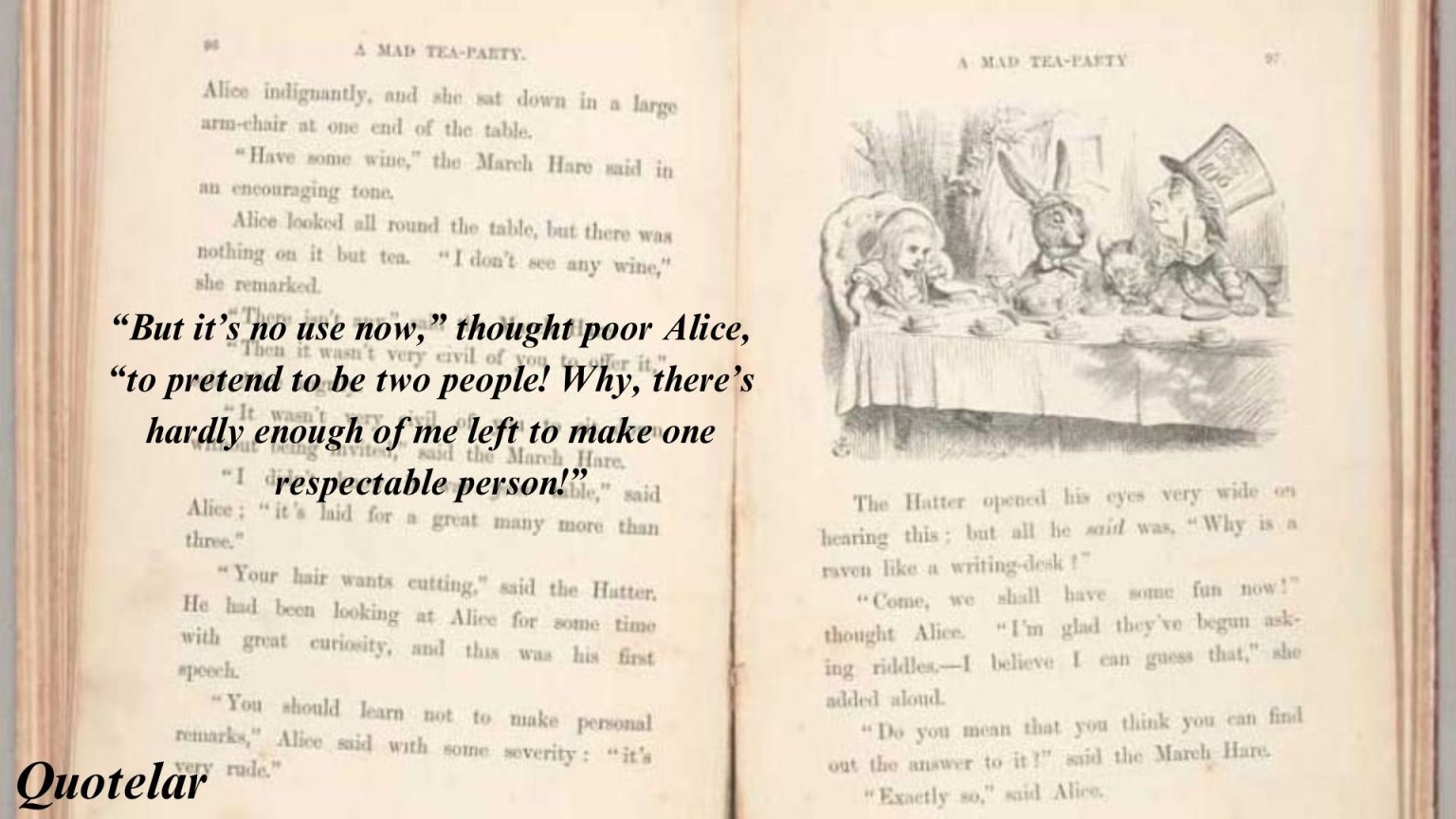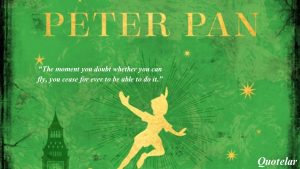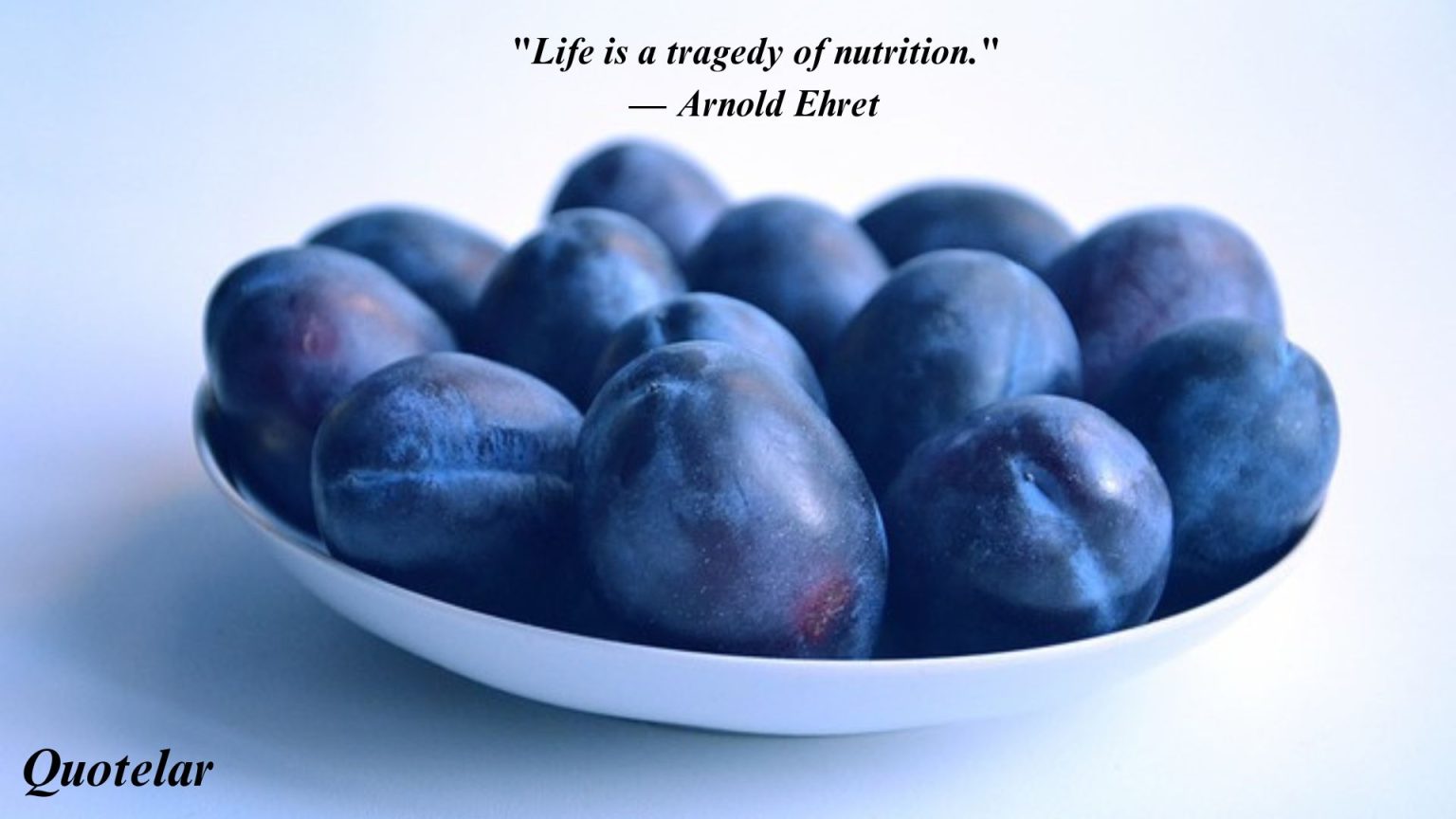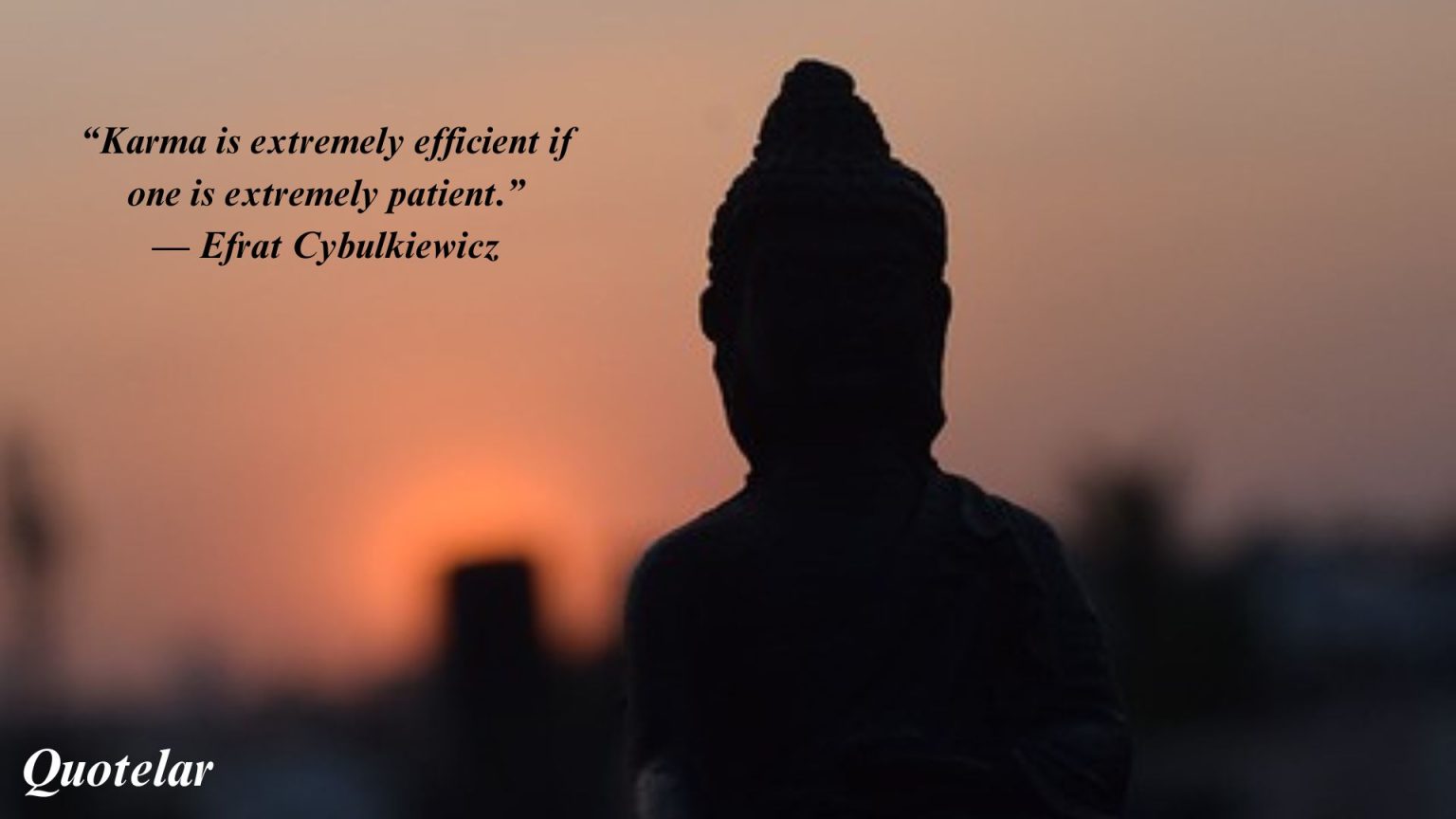“Alice’s Adventures in Wonderland” by Lewis Carroll is a classic novel with many memorable quotes.
Alice In Wonderland Book Quotes
1. “Visit either you like: they’re both mad.”
2. “We’re all mad here. I’m mad. You’re mad.”
3. “There might be some sense to your knocking,” the Footman went on, without attending to her, “if we had the door between us. For instance, if you were *inside,* you might knock and I could let you out, you know.”
4. “How queer everything is to-day! And yesterday things went on just as usual. I wonder if I’ve been changed in the night? Let me think: *was* I the same when I got up this morning?”
5. “Imagination is the only weapon in the war with reality.”
6. “You might just as well say,” added the March Hare, “that ‘I like what I get’ is the same thing as ‘I get what I like’!”
“You might just as well say, ” added the Dormouse, who seemed to be talking in his sleep, “that ‘I breathe when I sleep’ is the same thing as ‘I sleep when I breathe’!”
7. “Only a few find the way, some don’t recognize it when they do – some… don’t ever want to.”
8. “Well! I’ve often seen a cat without a grin,” thought Alice; “but a grin without a cat! It’s the most curious thing I ever saw in all my life!”
9. “How do you like the Queen?” said the Cat in a low voice.
“Not at all,” said Alice: “she’s so extremely—” Just then she noticed that the Queen was close behind her, listening: so she went on “—likely to win, that it’s hardly worth while finishing the game.”
10. “I don’t see how he can ever finish, if he doesn’t begin.”
11. “And the moral of that is—‘Be what you would seem to be’—or, if you’d like it put more simply—‘Never imagine yourself not to be otherwise than what it might appear to others that what you were or might have been was not otherwise than what you had been would have appeared to them to be otherwise.’”
12. Speak English!” said the Eaglet. “I don’t know the meaning of half those long words, and, what’s more, I don’t believe you do either!”
13. “I’m older than you, and must know better.”
Lewis Carroll
14. “The best way to explain it is to do it.”
15. “The Duchess! The Duchess! Oh my dear paws! Oh my fur and whiskers! She’ll get me executed, as sure as ferrets are ferrets!”
16. “Who are you?” said the Caterpillar.
This was not an encouraging opening for a conversation. Alice replied, rather shyly, “I—I hardly know, Sir, just at present—at least I know who I was when I got up this morning, but I think I must have been changed several times since then.”
“What do you mean by that?” said the Caterpillar, sternly. “Explain yourself!”
“I ca’n’t explain myself, I’m afraid, Sir,” said Alice, “because I am not myself, you see.”
17. “If everybody minded their own business,” the Duchess said, in a hoarse growl, “the world would go round a deal faster than it does.”
18. “Tut, tut, child!” said the Duchess. “Everything’s got a moral, if only you can find it.”
19. “And the moral of that is—’Oh, ‘tis love, ‘tis love, that makes the world go round!’”
“Somebody said,” Alice whispered, “that it’s done by everybody minding their own business!”
“Ah well! It means much the same thing,” said the Duchess, digging her sharp little chin into Alice’s shoulder as she added, “and the moral of that is—‘Take care of the sense, and the sounds will take care of themselves.’”
20. “I am not crazy; my reality is just different from yours.”
21. “Every adventure requires a first step.”
22. “How fine you look when dressed in rage. Your enemies are fortunate your condition is not permanent. You’re lucky, too. Red eyes suit so few.”
23. “Haste makes waste, so I rarely hurry. But if a ferret were about to dart up my dress, I’d run.”
24. “Not all who wander are lost.”
25. “Well, some go this way, and some go that way. But as for me, myself, personally, I prefer the short-cut.”
26. “When you’ve understood this scripture, throw it away. If you can’t understand this scripture, throw it away. I insist on your freedom.”
27. “If you don’t know where you are going any road can take you there.”
28. “Can you stand on your head?”
29. “The proper order of things is often a mystery to me.”
30. “I went to a hunting party once, I didn’t like it. Terrible people. They all started hunting me!”
31. “The uninformed must improve their deficit, or die.”
32. “Goodbye, sweet hat.”
33. “I never get involved in politics.”
34. “No one does [play fair] if they think they can get away with it.”
35. “If you’re gonna make it to the top, get a grip on this rock, and get a grip on yourself.”
36. “I’m stranger. You’re stranger. Together, we are… strangers.”
37. “I could hardly afford to lose my head.”
38. “You may have noticed, I’m not all there myself.”
39. “And no scheme of ours can raise any sort of smile.”
40. “We are all victims in-waiting.”
41. “When the day becomes the night and the sky becomes the sea, when the clock strikes heavy and there’s no time for tea; and in our darkest hour, before my final rhyme, she will come back home to Wonderland and turn back the hands of time.”
42. “Somehow you strayed and lost your way, and now there’ll be no time to play, no time for joy, no time for friends – not even time to make amends.”
43. “Actually, I am right on time.”
44. “Never let anyone drive you crazy; it is nearby anyway and the walk is good for you.”
45. “I can’t know everything.”
46. “It’s always tea time.”
47. “Let your need guide your behavior.”
48. “Would you tell me, please, which way I ought to go from here?”
“That depends a good deal on where you want to get to,” said the Cat.
“I don’t much care where—” said Alice.
“Then it doesn’t matter which way you go,” said the Cat.
“—so long as I get somewhere,” Alice added as an explanation.
“Oh, you’re sure to do that,” said the Cat, “if you only walk long enough.”
49. “And what is the use of a book,” thought Alice, “without pictures or conversations?”
50. “How funny it’ll seem to come out among the people that walk with their heads downwards! The antipathies, I think—”
51. “‘Oh, how I wish I could shut up like a telescope! I think I could, if only I knew how to begin.’ ‘For, you see, so many out-of-the-way things had happened lately, that Alice had begun to think that very few things indeed were really impossible.‘”
52. It was all very well to say “Drink me,” but the wise little Alice was not going to do that in a hurry. “No, I’ll look first,” she said, “and see whether it’s marked ‘poison’ or not.”
53. “But it’s no use now,” thought poor Alice, “to pretend to be two people! Why, there’s hardly enough of me left to make one respectable person!”
54. “Curiouser and curiouser!” cried Alice (she was so much surprised, that for the moment she quite forgot how to speak good English).
55. “I wish I hadn’t cried so much!” said Alice, as she swam about, trying to find her way out. “I shall be punished for it now, I suppose, by being drowned in my own tears! That will be a queer thing, to be sure! However, everything is queer to-day.”
56. “I suppose I ought to eat or drink something or other; but the great question is ‘What?’”
57. “I do wish I hadn’t drunk quite so much!”
58. “When I used to read fairy tales, I fancied that kind of thing never happened, and now here I am in the middle of one!”
59. “Really, now you ask me,” said Alice, very much confused, “I don’t think—”
“Then you shouldn’t talk,” said the Hatter.
60. “Take some more tea,” the March Hare said to Alice, very earnestly.
“I’ve had nothing yet,” Alice replied in an offended tone: “so I ca’n’t take more.”
“You mean you ca’n’t take less,” said the Hatter: “It’s very easy to take more than nothing.”
61. “Have some wine,” the March Hare said in an encouraging tone.
Alice looked all round the table, but there was nothing on it but tea. “I don’t see any wine,” she remarked.
“There isn’t any,” said the March Hare.
“Then it wasn’t very civil of you to offer it,” said Alice angrily.
“It wasn’t very civil of you to sit down without being invited,” said the March Hare.
62. “When we were little,” the Mock Turtle went on at last, more calmly, though still sobbing a little now and then,” we went to school in the sea. The master was an old Turtle—we used to call him Tortoise—”
“Why did you call him Tortoise, if he wasn’t one?” asked Alice.
“We called him Tortoise because he taught us,” said the Mock Turtle angrily. “Really you are very dull!”
63. “And how many hours a day did you do lessons?” said Alice, in a hurry to change the subject.
“Ten hours the first day,” said the Mock Turtle: “nine the next, and so on.”
“What a curious plan!” exclaimed Alice.
“That’s the reason they’re called lessons,” the Gryphon remarked: “because they lessen from day to day.”
64. The Queen turned crimson with fury, and, after glaring at her for a moment like a wild beast, began screaming “Off with her head! Off with—”
“Nonsense!” said Alice, very loudly and decidedly, and the Queen was silent.
65. “No, no!” said the Queen. “Sentence first—verdict afterwards.”
66. “I don’t like the look of it at all,” said the King: “however, it may kiss my hand, if it likes.”
67. “If there’s no meaning in it,” said the King, “that saves a world of trouble, you know, as we needn’t try to find any.”
68. “Begin at the beginning,” the King said, very gravely, “and go on till you come to the end: then stop.”
69. “If you didn’t sign it,” said the King, “that only makes the matter worse. You must have meant some mischief, or else you’d have signed your name like an honest man.”
70. “Rule Forty-two. All persons more than a mile high to leave the court.”
Everybody looked at Alice.
“I’m not a mile high,” said Alice.
“You are,” said the King.
“Nearly two miles high,” added the Queen.
“Well, I sha’n’t go, at any rate,” said Alice; “besides, that’s not a regular rule: you invented it just now.”
“It’s the oldest rule in the book,” said the King.
“Then it ought to be Number One,” said Alice.
71. Alice sighed wearily. `I think you might do something better with the time,′ she said, `than waste it in asking riddles that have no answers.′
`If you knew Time as well as I do,′ said the Hatter, `you wouldn’t talk about wasting it. It’s him.′
`I don’t know what you mean,′ said Alice.
`Of course you don’t!′ the Hatter said, tossing his head contemptuously. `I dare say you never even spoke to Time!′
`Perhaps not,′ Alice cautiously replied: `but I know I have to beat time when I learn music.′
`Ah! that accounts for it,′ said the Hatter. `He won’t stand beating. Now, if you only kept on good terms with him, he’d do almost anything you liked with the clock. For instance, suppose it were nine o’clock in the morning, just time to begin lessons: you’d only have to whisper a hint to Time, and round goes the clock in a twinkling! Half-past one, time for dinner!′
72. `Your hair wants cutting,′ said the Hatter. He had been looking at Alice for some time with great curiosity, and this was his first speech.
73. `Have you guessed the riddle yet?′ the Hatter said, turning to Alice again.
`No, I give it up,′ Alice replied: `what’s the answer?′
`I haven’t the slightest idea,′ said the Hatter.
73. `I want a clean cup,′ interrupted the Hatter: `let’s all move one place on.′
74. “Take off your hat,” the King said to the Hatter.
“It isn’t mine,” said the Hatter.
“Stolen!” the King exclaimed, turning to the jury, who instantly made a memorandum of the fact.
“I keep them to sell,” the Hatter added as an explanation; “I’ve none of my own. I’m a hatter.”
75. “Why is a raven like a writing-desk?”
76. The Hatter was the first to break the silence. “What day of the month is it?” he said, turning to Alice: he had taken his watch out of his pocket, and was looking at it uneasily, shaking it every now and then, and holding it to his ear.
Alice considered a little, and then said “The fourth.”
“Two days wrong!” sighed the Hatter. “I told you butter wouldn’t suit the works!” he added looking angrily at the March Hare.
Lewis Carroll
77. Alice did not wish to offend the Dormouse again, so she began very cautiously: “But I don’t understand. Where did they draw the treacle from?”
“You can draw water out of a water-well,” said the Hatter; “so I should think you could draw treacle out of a treacle-well–eh, stupid?”








